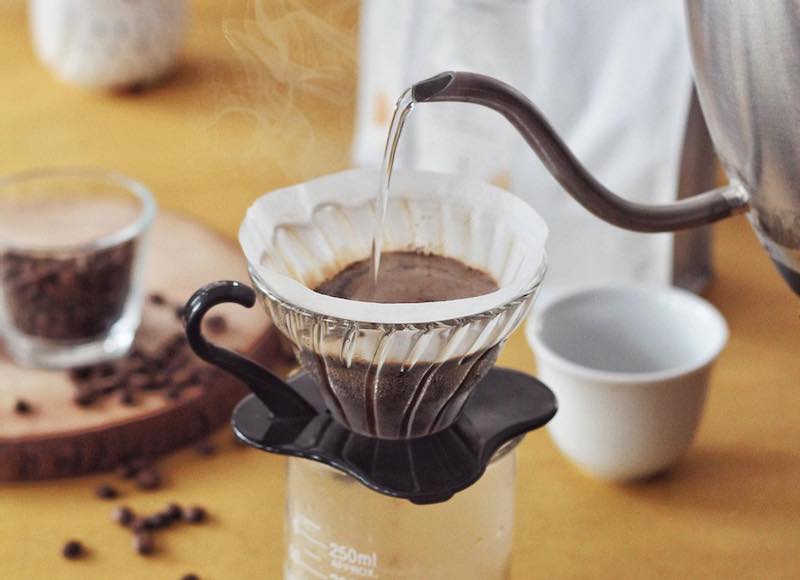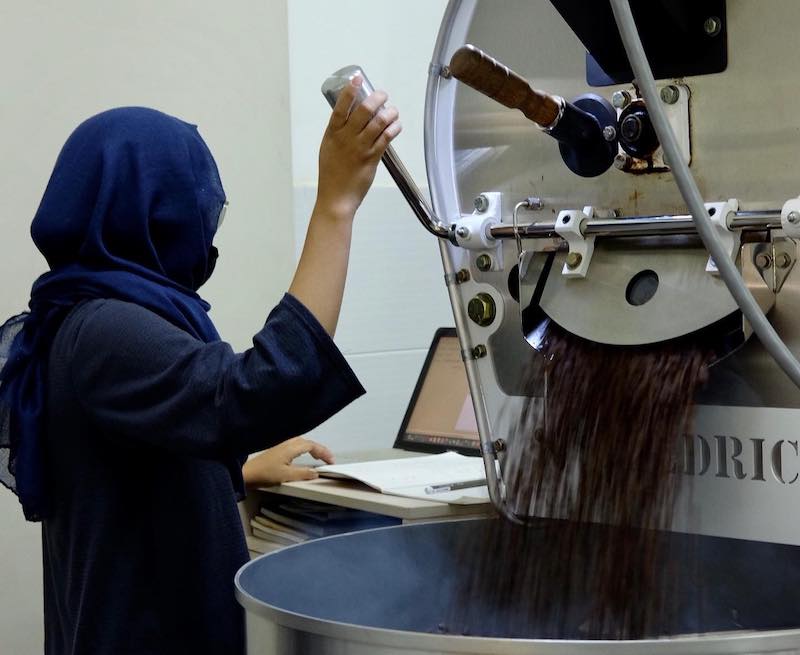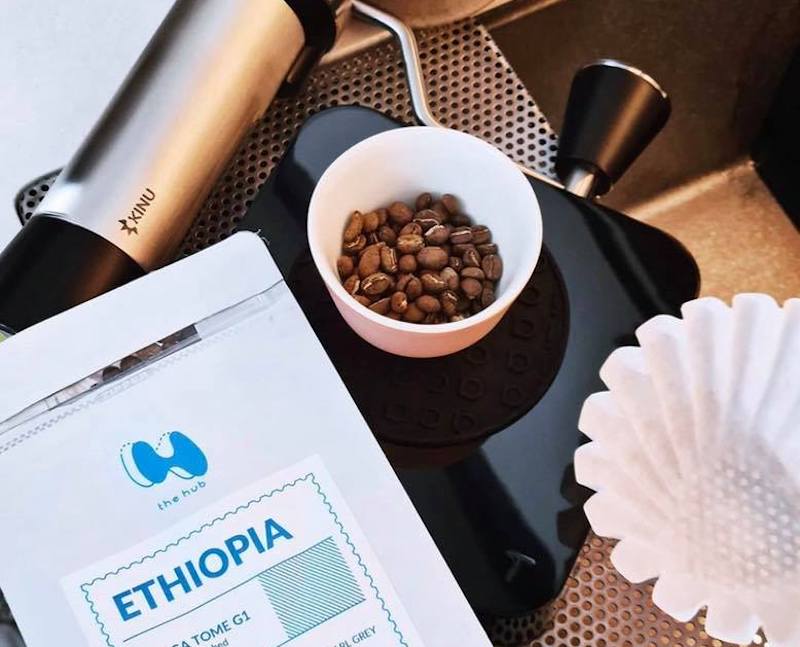
A global shortage of cargo containers and ships has sparked a logistics crisis across commodities, and the coffee industry is among those impacted (Photo: Ghostbird Coffee Company)
Coffee drinkers know that a good black or white does more than provide a necessary java jolt. In those dark depths or milky galaxies lie everything from hope or strength of will to peace or even sanity. When under duress, five minutes spent savouring that symphony of acidity, aroma, flavour, body and bitterness can be positively restorative.
However, tough times might be brewing ahead for the chronically caffeinated as logistical challenges, damaged crops and a surge in green coffee bean prices could translate to a more expensive cuppa. These issues have been percolating in regions around the world but some of the impact is shelved for now thanks in part to forward contracts between suppliers and buyers. These allow for prices to be locked in in advance, shielding buyers from volatility.
But as life returns to pre-pandemic normalcy and the next cycle of contracts kicks in, consumers could find their frequent habit redesignated as a luxury.
Brazil, which produces between 20% and 40% of the world’s coffee supply, has been hit by its worst drought in almost a century. Financial Times names this as the first supply shortfall in the coffee market in four years, which pushed the markets up further when combined with halted exports from Colombia earlier this year due to anti-government protests.
It came as little surprise then that the New York futures benchmark in July saw the premium arabica bean hit a four-and-a-half-year high. It skyrocketed up 70% from 2020 to strike the US$1.70 per pound mark, around which it has hovered since.
drip_coffee.jpeg

Local roasters have not been immune to relevant snags. A global shortage of cargo containers and ships has sparked a logistics crisis across commodities and the coffee industry is among those impacted.
“We’ve faced supply chain disruptions, with delayed shipments causing us to run out of stock for certain coffees,” says Thomas Ooi, who founded micro-roaster Ghostbird Coffee Company. “Coffee varieties are seasonal and we’re receiving them significantly later than scheduled. The beans themselves aren’t impacted much — if stored well, they’re okay for about a year — but we’ve had to adjust our planned offerings. Last year, our supplies from Colombia and Brazil were heavily affected, while this year we’re seeing delays from Indonesia.”
The Roast Things co-founder Chiam Tow Jin admits to similar hurdles. “We deal with two different types of suppliers: direct-from-farm for our Honduras purchases and merchants based in Europe and the US for the rest,” says the licensed Q-grader, which qualifies him to grade coffee. “Logistical issues are currently our biggest challenge. The frequency of sea freights has decreased, with delays spanning weeks to a couple of months. Even though you may book a vessel, you are still subject to cancellations depending on availability.”
roaster.jpeg

And shipping costs have risen in tandem.
“Container shortages from Africa and Latin America have pushed sea freight costs up a lot for us — I’d say around 30%,” says Nicholas Tay, founder of specialist roaster The Hub. “Our inventories are running low but — I don’t know if this is lucky or unlucky — the lockdowns these past few months have let us slowly ride out our low supplies as sales are down too. That said, we had to fly some beans in from Ethiopia and Colombia to stay ahead, which cost 80% more than sea freight.”
Ghostbird had locked in coffee prices with suppliers earlier this year while The Hub’s deals are tied to the New York market. “Parts of Latin America, such as Colombia and Panama, are seeing price rises. We buy 80% to 90% of coffee directly from farms and import it ourselves,” says Tay. “We have been absorbing the price increases so far and while our wholesale deals with local businesses have been halved, roasted coffee sales to overseas markets such as China and the Middle East have been helping to sustain us.”
Chiam shares that The Roast Things is unaffected by green coffee bean market prices as it has its own purchasing practices. “We don’t benchmark ourselves against the market. Our prices are pegged to quality, which means we easily pay twice or thrice listed commodity prices anyway. In that sense, sourcing costs for us are quite established,” he says. It has not escaped unscathed, however, with the combined blows of higher shipping and operation costs as well as lower wholesale and retail sales.
“Please drink more coffee,” jokes Ooi as he shares how an expansion into consumer sales assisted Ghostbird in weathering the sharp drop in demand for beans by local cafés.
the_hub.jpeg

While these micro-roasters have succeeded in holding the fort so far, they can only absorb so many costs before these have to be transferred to customers. And if analysts are to be believed, that reckoning is imminent once exporters clear their warehouses of stockpiled inventory that has been moving sluggishly during the pandemic.
“It’s the next set of deliveries that’s going to start being more expensive. The wholesale and retail prices will start to react between now till the end of the year,” London-based coffee trader Stephen Hurst told Financial Times.
Many coffee connoisseurs have invested in better home equipment and bean or blend subscriptions to keep caffeinated while working from home, but future behaviour hinges on what habits we carry into or return to in the post-pandemic world. Although market forces might dictate that takeaway coffee is a luxury for most in the near future, there will be those who will hold steadfastly onto their relationships with their favourite baristas.
Peace and pleasure, after all, can be priceless.
To brew in between
While waiting to once again lounge in your favourite cafés, enjoy the taste and restorative properties of these single-origin beans, blends or drip bags in the comfort of your own home.
Ethiopia Yirgacheffe G1 Washed, The Hub
This fruity and floral variety from the Yirgacheffe region of Ethiopia is directly traded from local partner, Ardent Coffee Export Ethiopia by Ashenafi. While The Hub carries some particularly exclusive beans, the filter coffee is a terrific option for the novice with its approachable flavours — think jasmine, blueberry, citrus and honey — and great value for money at RM60 per bag.
Purchase here.
Milkyway Espresso Blend, Ghostbird Coffee Company
A full-bodied medium dark roast with a chocolate-forward aroma and sweetness, the best-selling Milkyway Espresso Blend comprises 80% Brazil Royale beans and 20% Indonesian Sumatra Gayo beans. As its name suggests, the espresso was crafted with milk in mind. Choose your preferred coffee preparation method — everything from Moka Pot to Aeropress — to get the right grind size. Prices start from RM55 per 300g.
Purchase here.
Milk Killer, The Roast Things
While the award-winning Cream blend is a sure-fire bet (the roastery is associated with Cream Café in Dataran Prima, Petaling Jaya), consider trying flagship blend Milk Killer for your first foray into the brand’s offerings. This killer espresso pairs perfectly with milk, with notes of dark chocolate, pink grapefruit and sunflower seeds. Opt for the single-serve Immersion bag for a quick coffee fix, priced at
RM7 per pack.
Purchase here.
Mixed-flavour drip bags, My Liberica
If you are keen to expand your palate and sample a local product, check out My Liberica, named after Malaysia’s dominant liberica coffee beans. A great introductory point would be the trio of flavours in its mixed pack — the roasted nutty and caramelly Classic; Jackfruit with additional notes of lychee, blackberry and dried longan; and full-bodied Chocolate roasted French style. A 15-sachet set will set you back by RM90.
Purchase here.
This article first appeared on Aug 2, 2021 in The Edge Malaysia.


